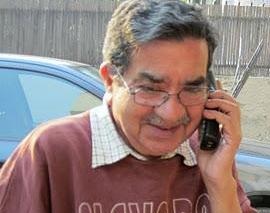
Jatinder Sethi was born in Lyallpur, now Faisalabad, in pre-Independence India. He finished his M.A. (English) from Delhi University in 1956, and went off to London to study Advertising in 1958. He passed his Membership Exam of The Institute of Practitioners in Advertising (M.I.P.A) in1965, and joined Rallis India in Bombay. Later, for over 20 years, he worked for the advertising agency Ogilvy &\; Mather. Now retired, he helps his son in his ad agency in Delhi.
An Eye-Witness Account of the Funeral Procession of Mahatma Gandhi
January 31 1948 - from Birla House to Rajghat, New Delhi
By a 16- year old Refugee Boy from Lyallpur
Flashback
My name is Jatinder Nath Sethi, born in November 1931, youngest child among six brothers and two sisters, all born in Lyallpur, now in Pakistan. I was in the 10th class in Arya School, Mai -Di-Jhugi, when the country got divided into India and Pakistan.
Till then, if I recall correctly, we never had any religious animosity between Hindus and Muslims. In fact, our closest friends were Muslim families. Not only that, but both religious communities together were involved in the freedom movement, though as a kid I didn't much understand it. I remember clearly the huge crowd that came out to greet Nehru when he, on a white horse, visited Dussera Grounds in Lyallpur. The freedom movement was at its height.